Baccanali
By Bruno Tredicine on 8/08/16 • Categorized as Festival,Opera
BACCANALI
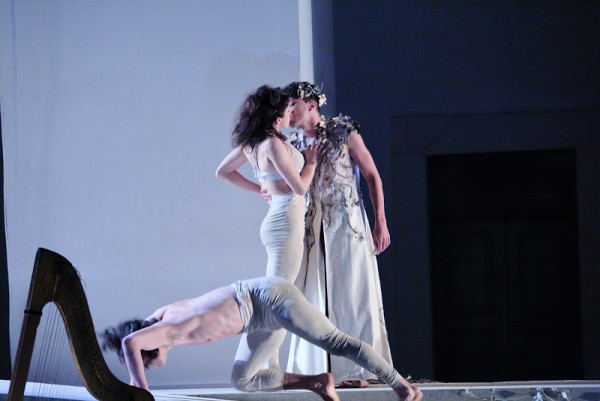
Baccanali at Festival Valle d´Itria
by Agostino Steffani
First performance in modern times
Review by Bruno Tredicine, fotos from the festival.

Festival Valle d´Itria
Place : Martina Franca – Chiostro di San Domenico
MARTINA FRANCA/ITALY: Last year Kulturkompasset met for the first time Festival Della Valle d’Itria, born in 1975 in the wonderful white small town of Martina Franca in Puglia (south east of Italy) and focused on forgotten or seldom performed operas from baroque and bel canto era.
Countless are the great singers who were there in the past or the opera productions that paved the history of the place.
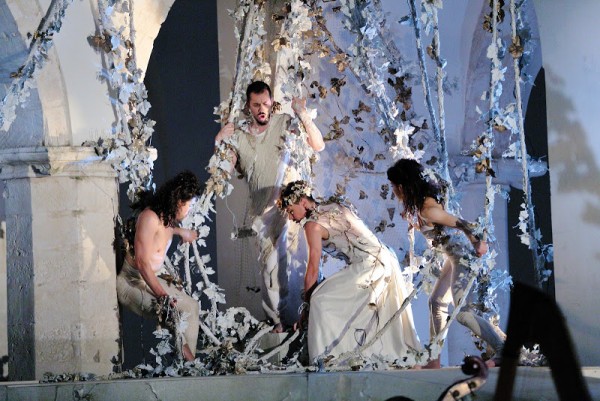
Baccanali
This year there were as usual many side events (concerts, recitals, prizes) and three main titles: Saverio Mercadante‘s never performed Francesca da Rimini, Paisiello‘ comic opera La grotta di Trofonio and Agostino Steffani‘s Baccanali.
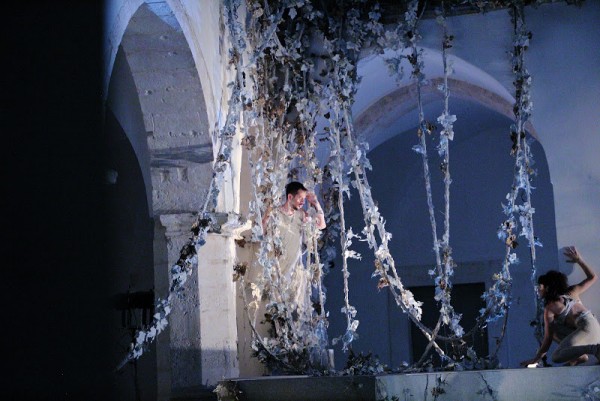
Baccanali
Steffani is a composer still to discover for the common music lover, more popular since a few years ago when world-famous mezzo Cecilia Bartoli devoted to him a whole CD, Passion.
Although forgotten in the centuries, he was a real protagonist of his time. Born in Italy, raised musically in Germany where he became the courts’ favourite mainly in Bavaria under Prince Elector Ferdinand Maria and in Hannover where he became Kapellmeister and many of his work had their premiere
. He left his place in the german city to noone less than Händel, and Händel himself was under Steffani’s musical influence.
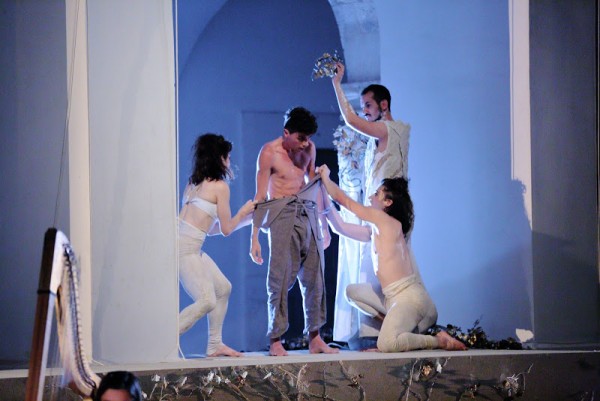
Baccanali
Man of society, bishop and diplomat, his multifaceted personality could be the reason why his activity as musician although of primary importance, was put in background in the centuries.
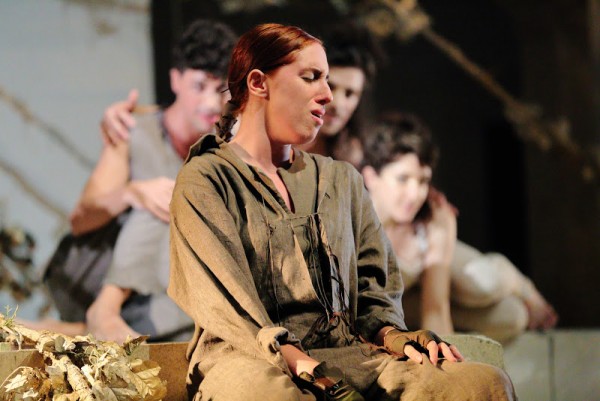
Elena Caccamo as Aminta in in Baccanali
Two years ago Festival of Valle d’Itria had already proposed one work of Steffani, La lotta di Ercole con Acheloo a Divertimento drammatico (or ‘dramatic divertissement’) exactly as this year’s Baccanali, written in 1695 for be represented before Hannover Court and now back to the stage thanks to the care of musicologist Cinthia Pinheiro Alireti.
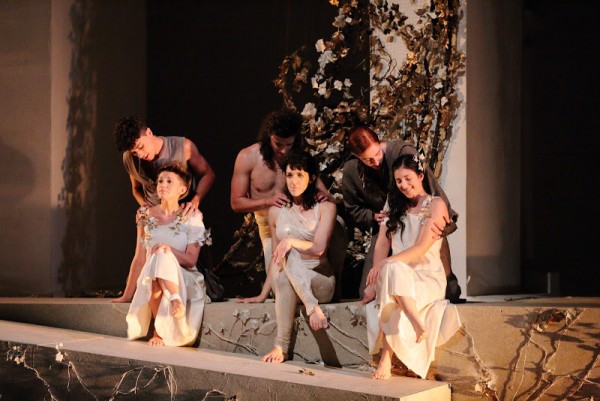
Baccanali by Agostino Steffani at Festival della Valle d´Itria
Systemic bioavailability was attenuated by pre-systemic hepatic metabolism, which is consistent to some extent with the plasma clearance value in each species. viagra billig • “Do you have difficulties in ejaculating, either too fast.
used to support the diagnosis of erectile dysfunction.Patients who fail oral drug therapy, who have cheap viagra.
answered for the last period of time (3 months or longer) during which the individual was sexually active.Based on these pharmacokinetic results co-administration of sildenafil with ritonavir is not advised, and in any event the maximum dose of sildenafil administered to a patient receiving ritonavir should not exceed 25 mg within 48 hours. cialis from canada.
. Italy
This is a celebrative work about the nature joy and love, probably written for a festive occasion like a birthday or a marriage, a pastoral play with nymphs and shepherds and gods, all young and under the spell of love, its joy and restlessness.
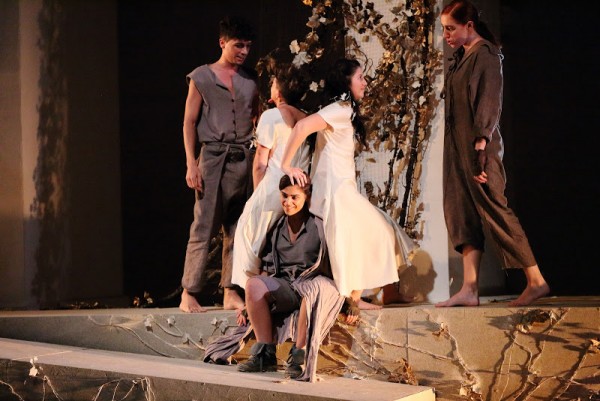
Bacchanali by Agostino Steffani at Festival Valle d´Itria, Italy. Reviewed by Bruno Tredicine, fotos from the Festival.
The work opens on Atlantis moaning of how heavy is the burden of the whole world on his shoulder and is closed by Bacchus inviting to celebrate the joy of nature and love. In the middle the nymphs are making fun of the melancholic and solitary Dryad as well as of Ergasto’ love pains while other characters are enjoying life and peace.
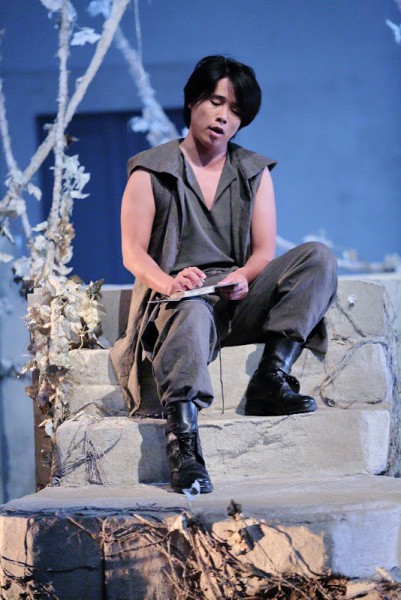
Yasushi Watanabe as Agasto in Bacchanali by Agostino Steffani at Festival Valle d´Itria, Italy. Reviewed by Bruno Tredicine, fotos from the Festival.
The bucolic plot found a convenient venue in the Cloister of St. Domenico Church, where the old arches integrated the simple scenery: an overhead platform with a small stair on one side allowing the artists to descend into the stalls and some scenic element, like trees’ branches coming down, structures with leaves and so on.
Eight young artists
Eight young artists have given their best in musical and acting terms under the stage direction of Cecilia Ligorio, their youthness bringing a natural spontaneous sensuousness and a vivid sense of physicality.
Constant was the presence of two dancers on stage Joseba Yerro Izaguirre and the choreographer Daisy Ransom Philips who has created insinuating cat-like movements.
Well integrated are the costumes all in colours recalling the nature by Manuel Pedretti and the light project by Marco Giusti.
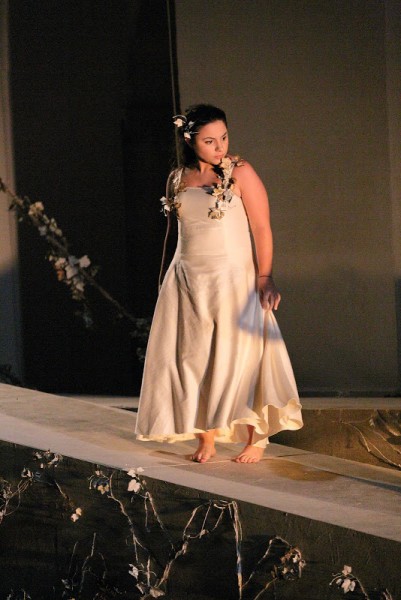
Barbara Massaro as Dryad in Bacchanali by Agostino Steffani at Festival Valle d´Itria, Italy. Reviewed by Bruno Tredicine, fotos from the Festival.
Ensemble Cremona Antiqua
The score was played by Ensemble Cremona Antiqua under conductor and Clavicembalist Antonio Greco
.
Playing old instruments, the musicians were stilistically compact and artistically motivated: right attitude in working together, well chosen dynamics and tempos.
Riccardo Angelo Strano
Among the singers outstanding countertenor Riccardo Angelo Strano distinguished himself in the double role of Thirsis and Bacchus.
This young Sicilian artist captures with a fluidity in his singing and a uniform timbre thanks to a voice that doesn’t let nothing to desire in terms of extension: solid well timbred in the low notes and with shining high notes.
Expressivity and magnetic stage presence make Strano an artist not to be missed.
Only grave voice in the cast Nicolò Donini has given his impressive bass to Atlante.
Yasushi Watanabe
Japanese tenor Yasushi Watanabe has showed an important timbre rich in volume and but not always well sustained. His was one of the most evocative moments with the moving aria Di taciturne belve.
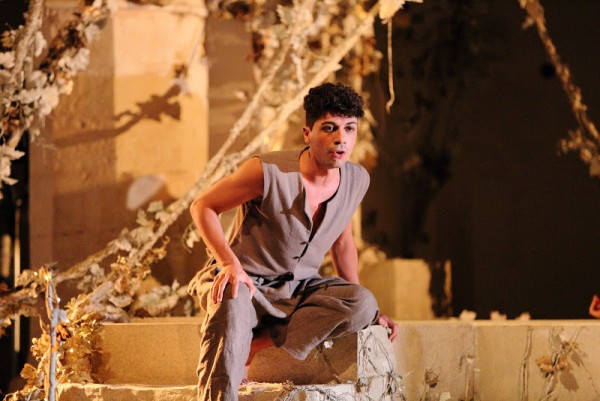
Riccardo Angelo Strano, countertenor, in the double role as Thirsis and Bacchus in Baccanali. by Agostino Steffani.
Barbara Massaro was Dryad with a solid compact singing line while Elena Caccamo gave good dramatic accents to the male part of Aminta.
Well staged the other roles with all the young singers stylistically appropriate and deserving prases for the care put in their task: Paola Leoci (Clori), Vittoria Magnarello (Celia) and Chiara Manese (Fileno).
At the end great success with strong long applause to all the cast and even more to Maestro Greco.
Production:
Libretto by Ortensio Mauro
Critical edition by Cinthia Pinheiro Alireti
Atlas NICOLÒ DONINI
Bacchus/Thyrsus RICCARDO ANGELO STRANO
Dryad BARBARA MASSARO
Celia VITTORIA MAGNARELLO
Chloris PAOLA LEOCI
Aminta ELENA CACCAMO
Philinus CHIARA MANESE
Ergasto YASUSHI WATANABE
Music director and conductor at the harpsichord ANTONIO GRECO
Director CECILIA LIGORIO
Scenes ALESSIA COLOSSO
Costumes MANUEL PEDRETTI
Light design MARCO GIUSTI
Dancer JOSEBA YERRO IZAGUIRRE, DAISY RANSOM PHILLIPS
Choreography DAISY RANSOM PHILLIPS
